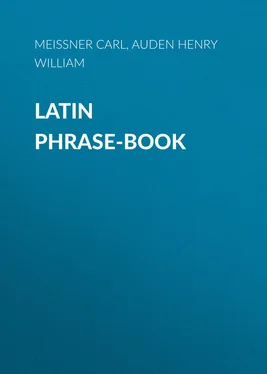Carl Meissner - Latin Phrase-Book
Здесь есть возможность читать онлайн «Carl Meissner - Latin Phrase-Book» — ознакомительный отрывок электронной книги совершенно бесплатно, а после прочтения отрывка купить полную версию. В некоторых случаях можно слушать аудио, скачать через торрент в формате fb2 и присутствует краткое содержание. Жанр: foreign_antique, foreign_prose, на латинском языке. Описание произведения, (предисловие) а так же отзывы посетителей доступны на портале библиотеки ЛибКат.
- Название:Latin Phrase-Book
- Автор:
- Жанр:
- Год:неизвестен
- ISBN:нет данных
- Рейтинг книги:5 / 5. Голосов: 1
-
Избранное:Добавить в избранное
- Отзывы:
-
Ваша оценка:
- 100
- 1
- 2
- 3
- 4
- 5
Latin Phrase-Book: краткое содержание, описание и аннотация
Предлагаем к чтению аннотацию, описание, краткое содержание или предисловие (зависит от того, что написал сам автор книги «Latin Phrase-Book»). Если вы не нашли необходимую информацию о книге — напишите в комментариях, мы постараемся отыскать её.
Latin Phrase-Book — читать онлайн ознакомительный отрывок
Ниже представлен текст книги, разбитый по страницам. Система сохранения места последней прочитанной страницы, позволяет с удобством читать онлайн бесплатно книгу «Latin Phrase-Book», без необходимости каждый раз заново искать на чём Вы остановились. Поставьте закладку, и сможете в любой момент перейти на страницу, на которой закончили чтение.
Интервал:
Закладка:
tempus (spatium) deliberandi or ad deliberandum postulare, dare, sibi sumere – to require, give, take time for deliberation.
paucorum dierum spatium ad deliberandum dare – to give some one a few days for reflection.
tempori servire, 28 28 The verb servire helps to form several phrases, e.g. servire valetudini , to be a valetudinarian; iracundiae , to be unable to restrain one's anger; brevitati , to be concise; communi utilitati , to be devoted to the public good, etc.
cedere – to accommodate oneself to circumstances.
ex quo tempore or simply ex quo – since the time that, since (at the beginning of a sentence).
eo ipso tempore, cum; tum ipsum, cum – at the same moment that, precisely when.
incidunt tempora, cum – occasions arise for…
tempus (ita) fert (not secum ) – circumstances demand.
tempus maximum est, ut – it is high time that…
haec tempora, nostra haec aetas, memoria – the present day.
his temporibus, nostra (hac) aetate, nostra memoria, his (not nostris ) diebus – in our time; in our days.
nostra aetas multas victorias vidit – our generation has seen many victories.
memoria patrum nostrorum – in our fathers' time.
aetate (temporibus) Periclis – in the time of Pericles.
antiquis 29 29 antiquitas = the state of affairs in times gone by, not a division of time; so antiquitatis studia , archaeology; veteres or antiqui poetae, populi , the poets, people of antiquity; antiqua monumenta , the relics of antiquity. antiquitates plur. is used for the institutions, usages of times gone by.
temporibus – in old days, in the olden time.
libera re publica – in the time of the Republic.
tempora Caesariana – the imperial epoch.
media quae vocatur aetas – the middle ages.
Pericles summus vir illius aetatis – Pericles, the greatest man of his day.
Pericles, quo nemo tum fuit clarior – Pericles, the greatest man of his day.
Pericles, vir omnium, qui tum fuerunt, clarissimus – Pericles, the greatest man of his day.
vir ut temporibus illis doctus – a man of considerable learning for those times.
tempore progrediente – in process of time.
primo quoque tempore – at the first opportunity.
hoc tempore – at this moment.
puncto temporis – in an instant.
momento 30 30 momentum (i.e. movimentum ) is properly that which sets in motion, which gives a decisive impulse to things, cf. Luc. iv. 819, momentumque fuit mutatus Curio rerum . Livy and later writers employ the word in the sense of a moment of time.
temporis – at the important moment.
in ipso discrimine (articulo) temporis – just at the critical moment.
temporis causa – on the spur of the moment.
ad tempus 31 31 ad tempus also means (1) according to the circumstances of the case, e.g. ad tempus consilium capere , (2) for a short time, temporarily.
adesse – to be there at a given time.
ad exiguum tempus – for a short time.
brevis or exigui temporis – for a short time.
satis longo intervallo – after a fairly long interval.
spatio temporis intermisso – after some time.
in praesentia, in praesens (tempus) – at present; for the moment.
in posterum; in futurum – for the future.
in perpetuum – for ever.
semel atque iterum; iterum ac saepius; identidem; etiam atque etiam – more than once; repeatedly.
futura providere (not praevidere ) – to foresee the future.
futura or casus futuros (multo ante) prospicere – to foresee the far distant future.
futura non cogitare, curare – to take no thought for the future.
saeculi 32 32 The spirit of a thing is usually rendered by such words as natura, proprietas, ratio atque voluntas , e.g. the spirit, genius of a language, natura or proprietas sermonis ; the spirit of the laws, voluntas et sententia legum .
consuetudo or ratio atque inclinatio temporis (temporum) – the spirit of the times, the fashion.
his moribus – according to the present custom, fashion.
9. Year – Seasons
praeterito anno (not praeterlapso ) – in the past year.
superiore, priore anno – last year.
proximo anno – (1) last year; (2) next year.
insequenti(e) anno (not sequente ) – in the following year.
anno 33 33 Unless one is emphasised unus is left out with the following words: annus, mensis, dies, hora , and verbum .
peracto, circumacto, interiecto, intermisso – after a year has elapsed.
anno vertente – in the course of the year.
initio anni, ineunte anno – at the beginning of the year.
exeunte, extremo anno – at the end of the year.
singulis annis, diebus – year by year; day by day.
quinto quoque anno – every fifth year.
ad annum – a year from now.
amplius sunt (quam) viginti anni or viginti annis – it is more than twenty years ago.
viginti anni et amplius, aut plus – twenty years and more.
abhinc (ante) viginti annos or viginti his annis – twenty years ago.
quinque anni sunt or sextus annus est, cum te non vidi – I have not seen you for five years.
quinque annos or sextum (iam) annum abest – he has been absent five years.
anno ab urbe condita quinto – in the fifth year from the founding of the city.
commutationes temporum quadripartitae – the succession of the four seasons.
verno, aestivo, auctumnali, hiberno tempore – in spring, summer, autumn, winter time.
ineunte, primo vere – at the beginning of spring.
ver appetit – spring is approaching.
suavitas verni temporis – the charms of spring.
summa aestate, hieme – in the height of summer, depth of winter.
hiems subest – winter is at hand.
hiemem tolerare – to bear the winter.
anni descriptio – the division of the year (into months, etc.)
annus (mensis, dies) intercalaris – the intercalary year (month, day).
fasti – the calender (list of fasts and festivals).
10. Day – Divisions of the Day
ante lucem – before daybreak.
prima luce – at daybreak.
luce (luci) – in full daylight.
ubi illuxit, luxit, diluxit – when it was day.
lucet – it is daylight.
diluculo – in the morning twilight.
advesperascit – evening is drawing on.
die, caelo vesperascente – when it is growing dusk; towards evening.
multus dies or multa lux est – the day is already far advanced.
ad multam noctem – till late at night.
de nocte, de die – while it is still night, day.
multa de nocte – late at night.
intempesta, concubia nocte – in the dead of night; at midnight.
silentio noctis – in the silence of the night.
vicissitudines dierum noctiumque – the succession of day and night.
Читать дальшеИнтервал:
Закладка:
Похожие книги на «Latin Phrase-Book»
Представляем Вашему вниманию похожие книги на «Latin Phrase-Book» списком для выбора. Мы отобрали схожую по названию и смыслу литературу в надежде предоставить читателям больше вариантов отыскать новые, интересные, ещё непрочитанные произведения.
Обсуждение, отзывы о книге «Latin Phrase-Book» и просто собственные мнения читателей. Оставьте ваши комментарии, напишите, что Вы думаете о произведении, его смысле или главных героях. Укажите что конкретно понравилось, а что нет, и почему Вы так считаете.

![Рис Хьюз - Madonna Park[e-book - рассказы]](/books/94285/ris-hyuz-madonna-park-e-book-rasskazy-thumb.webp)










